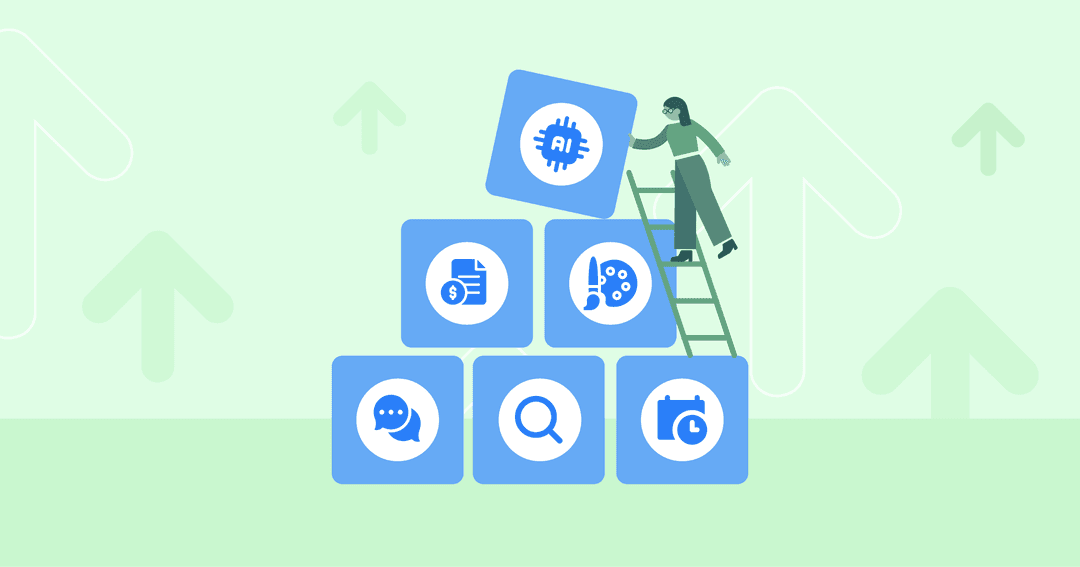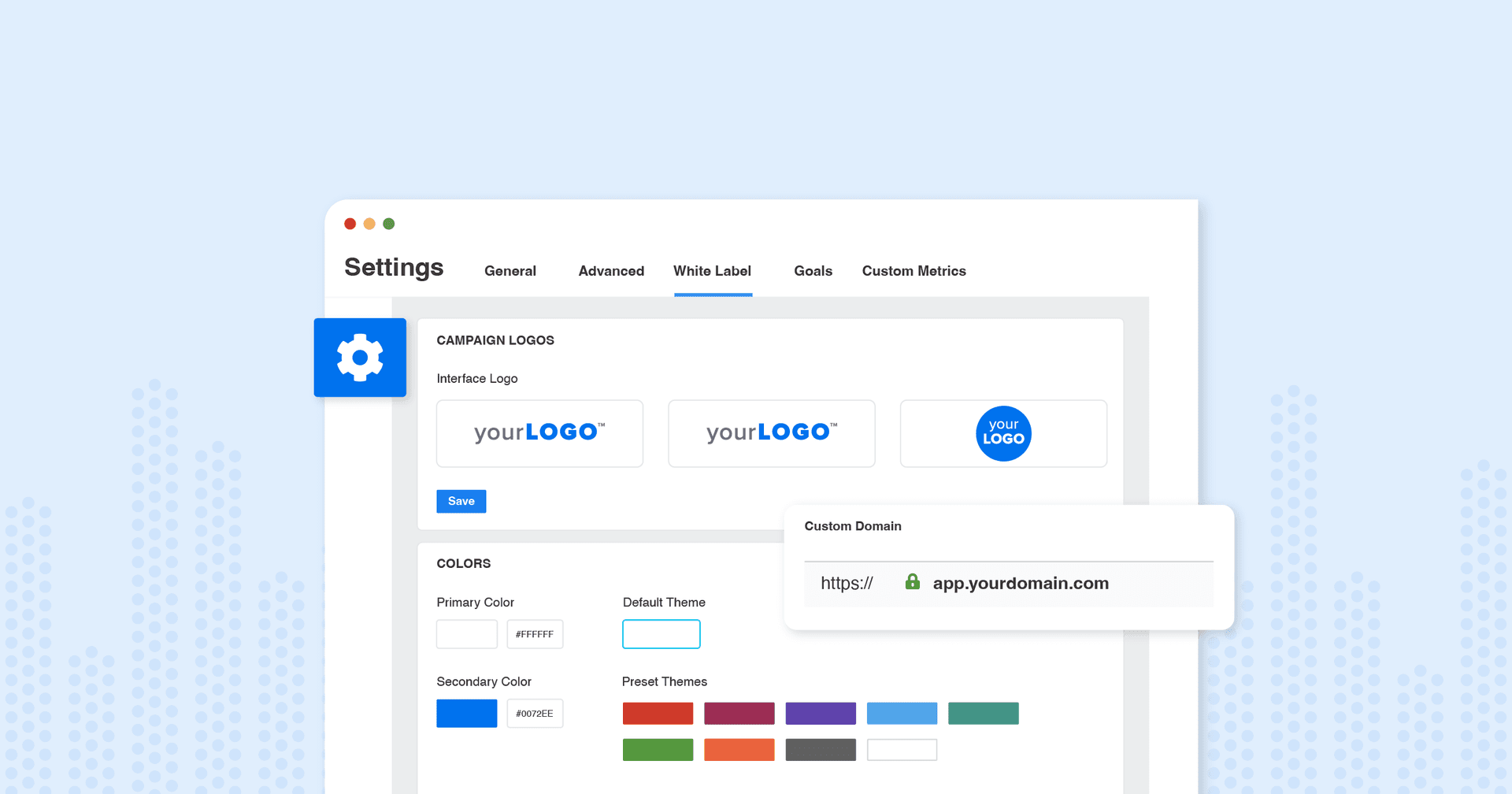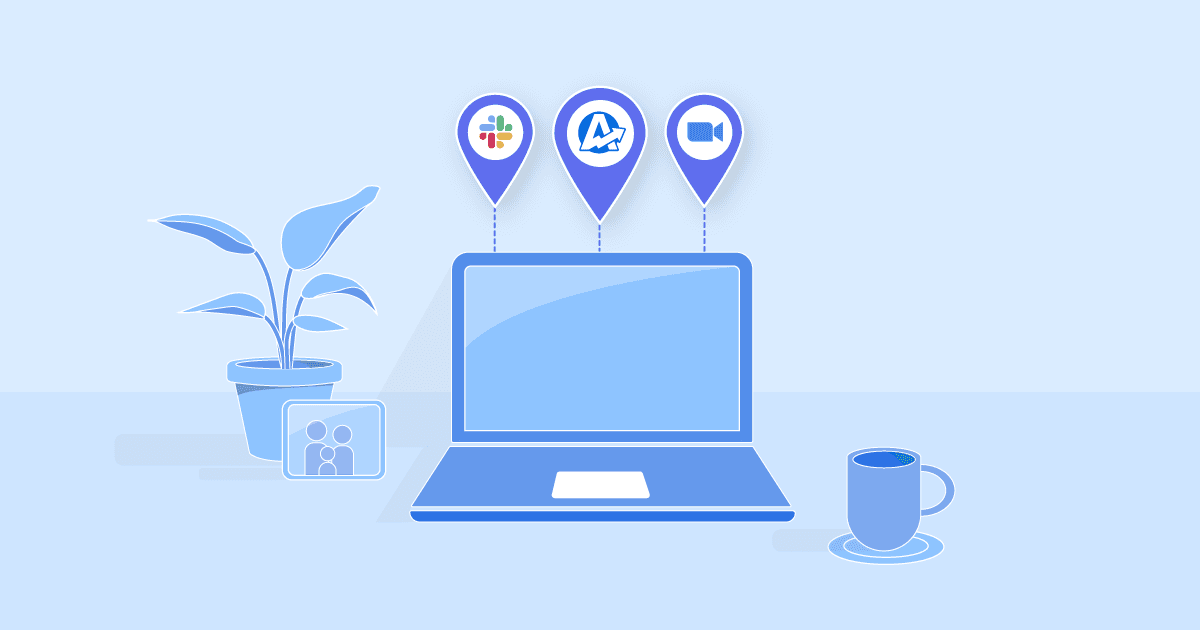Table of Contents
QUICK SUMMARY:
A marketing agency tech stack drives operational efficiency and supports diverse functions such as team productivity, client reporting, project management, and creative production. But as agencies scale, the tech stack often becomes inefficient. A strategic overhaul ensures seamless integration, functionality, and efficiency.
Agencies are known for their hustle and bustle: striving to win new clients, projects coming in, proposals going out, teams collaborating at peak velocity...all the while trying to keep the operation running smoothly. The undercurrent of all of it is your agency tech stack.
Your tech stack supports team productivity, project and budget management, creative production, and so much more. Yet too often, it feels like a cobbled-together compound machine that only gets jankier as you scale. It might get the job done, but there are inefficiencies, haphazard solutions, and discrepancies between systems.
Modern tech stacks need not be so complex! As an agency leader bringing together your collection of tools and technologies, you want to make sure you're building a system that supports the agency’s core operations—not one that slows things down. To get the right tech stack up and running, keep reading for the keys to success and essential pieces you'll want to be sure to include.
Finding a platform that worked with our entire tech stack was a struggle. Email, DSP, Google Ads, Social, eComm, Analytics, and more. But we found it with AgencyAnalytics. Plus, if an integration is missing the support team is AMAZING in helping us. From adding integrations to adding in new metrics.
Tim Akers, Founder, Akers Digital
What Is an Agency Tech Stack?
An agency tech stack is the collection of technology tools that an agency uses to run its operations efficiently. Cross‑reference our agency software stack guide to pressure‑test your selections. It encompasses everything from marketing to project management tools, communication platforms, accounting software, and more.
At a marketing or advertising agency, your tech stack plays a crucial role in streamlining your workflows, managing client relationships, and delivering services effectively.
Further, for agency leaders, refining the tech stack literally puts minutes (and even hours) back into your calendar–the time saved by streamlining processes through perfectly aligned tech adoption frees you up to focus on the activities that will scale the agency.
We utilize a combination of tools like AgencyAnalytics, Trello, Slack, and HubSpot. Each of these tools serves specific purposes within our workflow: AgencyAnalytics for analytics and reporting, Trello for project management and task tracking, Slack for communication and collaboration, and HubSpot for customer relationship management (CRM) and marketing automation.
These tools collectively provide comprehensive support, allowing us to streamline our processes, coordinate tasks, communicate effectively, and analyze performance. This integrated approach has proven highly beneficial for our agency, enabling us to optimize our marketing efforts and achieve our goals efficiently.
Gia Ching, Managing Director, GCC Consulting, LLC
Why Getting Your Tech Stack Right Is So Important
A well-structured tech stack is vital for your agency's success. Why? Because it's like the operating system for your business. A modern tech stack will automate tasks and streamline processes, but an outdated or ineffective one could lead to lag times and inefficiencies.
Your technology infrastructure facilitates everything from your internal processes to managing data across systems and performance monitoring with business intelligence tools. So of course, you want it to run smoothly.
Software and technologies are constantly changing, meaning that—on top of keeping our clients happy—we need to find time for upskilling. But this has been aided by the flexibility of AgencyAnalytics, which has been quick to integrate with the new software we use—allowing us to keep everything in one place (something our clients really like, as it simplifies an increasingly complicated landscape).
Dr. Richard Girling, CEO, Red Castle Services INC
Here are 5 key reasons why highly functional tech stacks make all the difference:
1. Reduced Risk of Errors
A tech stack that's disjointed has the potential to wreak havoc, with numbers that don't add up and inconsistent information from one tool to the next. The impact of these types of mistakes range from reduced productivity for your team to costly blunders with clients.
Conversely, when tools are well-integrated, there are fewer data discrepancies and silos between systems. This means both your teams and your tech have access to accurate, up-to-date information, reducing the chance of errors and mix-ups and enabling time and cost-saving automations.
2. Improved Client Relationships
When your team is jumping around between a disconnected CRM, document management system, and client communication platform, it wastes time and leads to delays. In fact, the entire customer journey might end up feeling as jumbled as the technology stack that's supposed to be supporting it.
A cohesive tech stack, on the other hand, allows your agency to maintain organized client data, track interactions, and provide personalized experiences. Your clients will have a more consistent experience from your sales process right through to your pitches and solutions implementation.
3. Stronger Collaboration
Client relationships are important, but so are team relationships, and a tech stack that hinders collaboration puts your agency's success at risk. If team members can't work creatively together across systems, or are consistently bogged down with tedious menial tasks, they won't be able to deliver the value that your agency is known for.
That said, when tools are integrated and user-friendly, teams are able to collaborate in real-time, share resources easily, and maintain a cohesive approach to projects. Departments might be working in different tech stacks within your agency's broader technology ecosystem, but they'll be empowered to collaborate cross-functionally and stay aligned on client objectives.
4. Better Data Analysis
Just as data becomes difficult to manage with a poorly connected tech stack, it also becomes difficult to analyze and derive insights from. If your agency can't trust your business intelligence data, you won't be able to communicate it as results for your clients—let alone use it to make meaningful recommendations.
A functional tech stack often includes analytics tools that gather, process, and visualize data. This enables your agency to make data-driven decisions for both your own operations and your client's strategies. A polished and professional report goes a long way for earning client trust (more on that later!).
5. Scalability and Flexibility
Often, your agency tech stack gets built in the early days where you're a small, scrappy team with big ambitions. But if you fall into the trap of freemiums and startup-friendly solutions, it could lead to tech debt as you scale. Additionally, if your agency opts for any systems that are insular and don't integrate well with other technology, you risk painting yourself into a corner.
This is why the right tech stack will be adaptable to your agency's evolving needs. Technology that's built to scale with growing businesses will be friendly for both your current agency tech stack and the tech stack of your future state. Tools that are equipped with integrations or APIs are also ideal, because it offers flexibility as you add new tools to your tech stack.
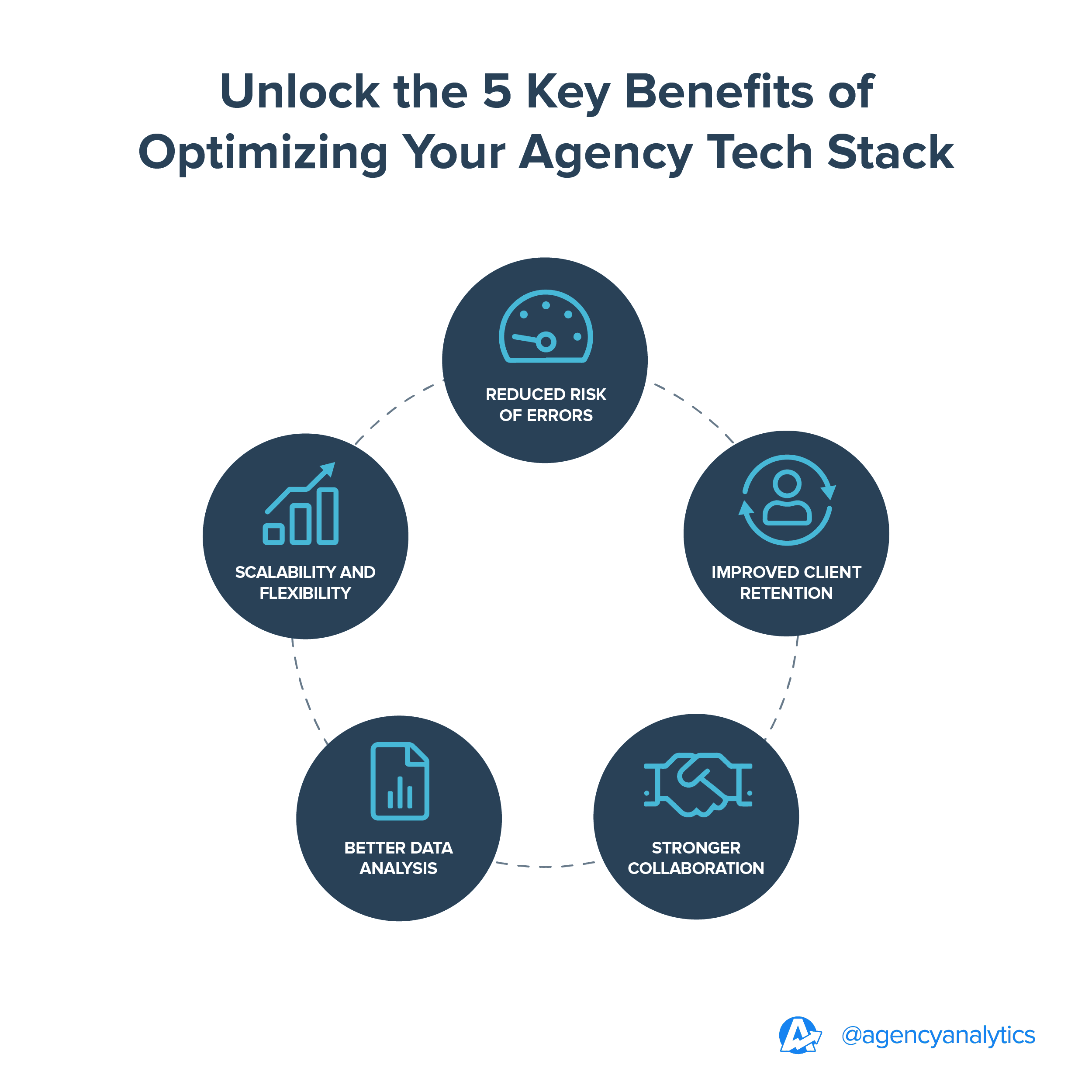
Whether you're a new business, a startup or small business, or a scale-up, it's never too late to invest in the right technology. Now that we've covered the ins and outs of all the benefits of a well-built modern tech stack, let's explore the components that you might consider adding to your agency's solutions stack.
14 Must-Have Elements of Your Agency Tech Stack
Tech stacks are ubiquitous for agencies today, but how do you know if yours has everything it needs? New tools and technologies are constantly flooding the market. It's not always clear which ones are must-haves and which ones will just add dead weight to an already-overrun tech stack.
Remember that since no two agencies operate in quite the same way, each agency tech stack will be a bespoke solution. The specific combination of software and technologies you implement will vary depending on how your agency operates, the tasks you want to support with your tech stack, and the size of your business.
As you select digital marketing agency tools, keep the following factors in mind:
Functionality: What does the tool or tech actually do? How will it support your team, and does it have the essential features needed to perform those tasks effectively? Start with the essentials, then build up around that.
Usability: Is it user-friendly and easy to implement? Does it have an intuitive user interface, and a short time-to-value? The last thing you need is a complex new technology that drags down team productivity and morale.
Connectivity: What plug-and-play integrations are included with the software? Will you need to configure complex custom connectors to your web server, and learn a programming language just to do so? Ideally, tools will connect with your existing tech stack without the need to write code.
With these tips in mind, let's explore some of the top solutions that agencies add to their tech stacks:
1. Customer Relationship Management (CRM) Systems
A CRM system is an essential tool for agencies to store and manage client data. Typically, these platforms offer a client database that houses records of each client's contact information, communication history, sales history, and more. This makes keeping track of all the interactions a client has had with your agency easier, allowing different team members to jump in and get a clear picture of a client's history with your team.
In addition to client histories, a CRM also supports your agency's marketing and lead capture efforts.
As noted in the 2023 Marketing Agency Benchmarks report, client acquisition remains a top priority for most marketing agencies. CRM systems keep the pipeline organized as you make new connections.
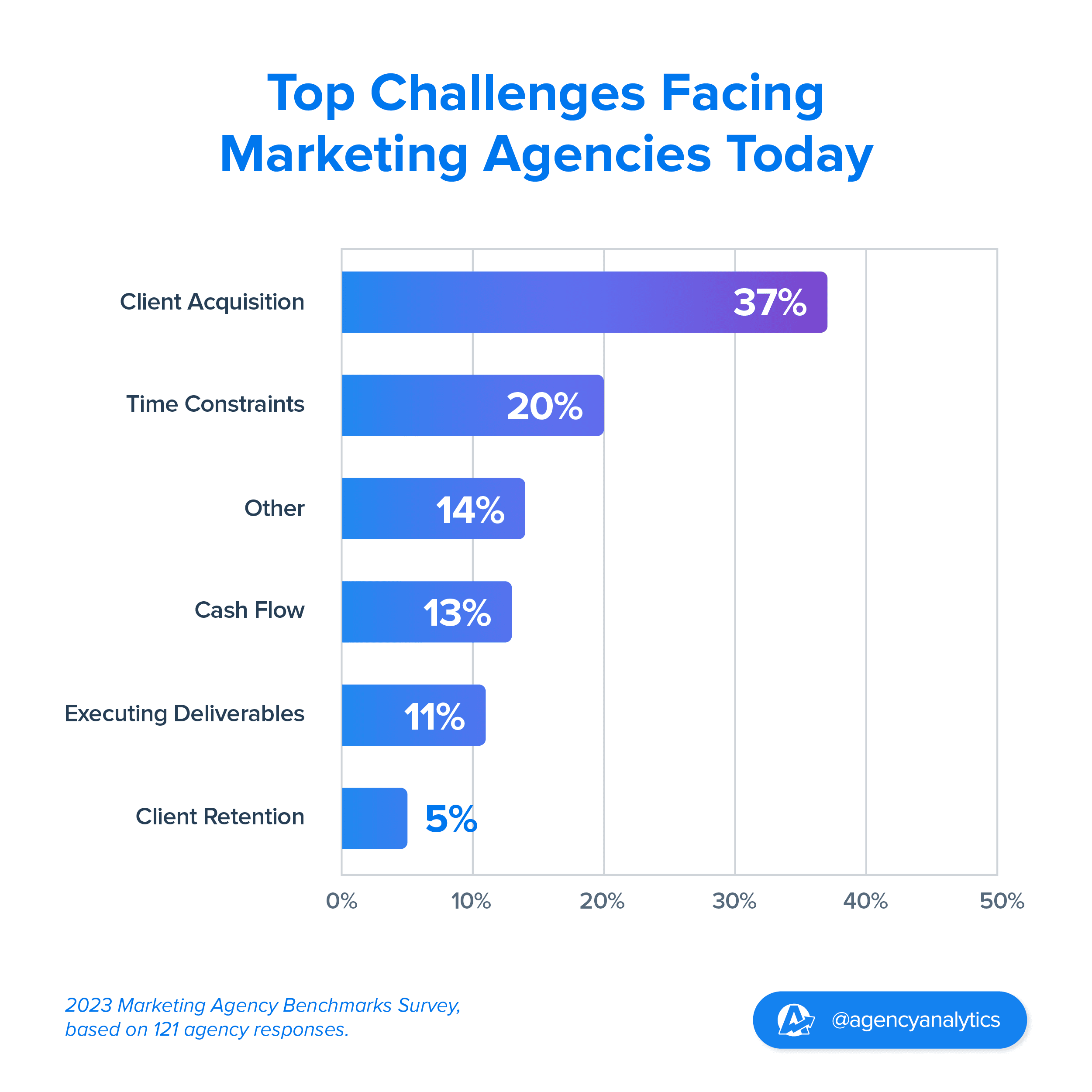
Many of these platforms double as marketing technology, with features for email and social media management, automated workflows, and tools to build forms and landing pages. This allows your agency to track the entire customer journey, from when visitors turn into qualified leads to eventually, paying customers.
2. Project Management Software
Project management tools help agencies plan, execute, and track their projects. These platforms typically offer features like:
Task management (assigning tasks to team members, setting due dates, etc.)
Various project views (Kanban boards, Gantt charts, Calendar views, etc.)
Performance monitoring (tracking team KPIs like items delivered, average time spent on tasks, etc.)
Especially as your agency scales, having a system to keep track of all your project details is crucial. Post-it notes just won't cut it when you're juggling multiple clients and portfolios!
3. Resource Management Tools
Most agencies highlight that time management is a consistent barrier to agency growth.
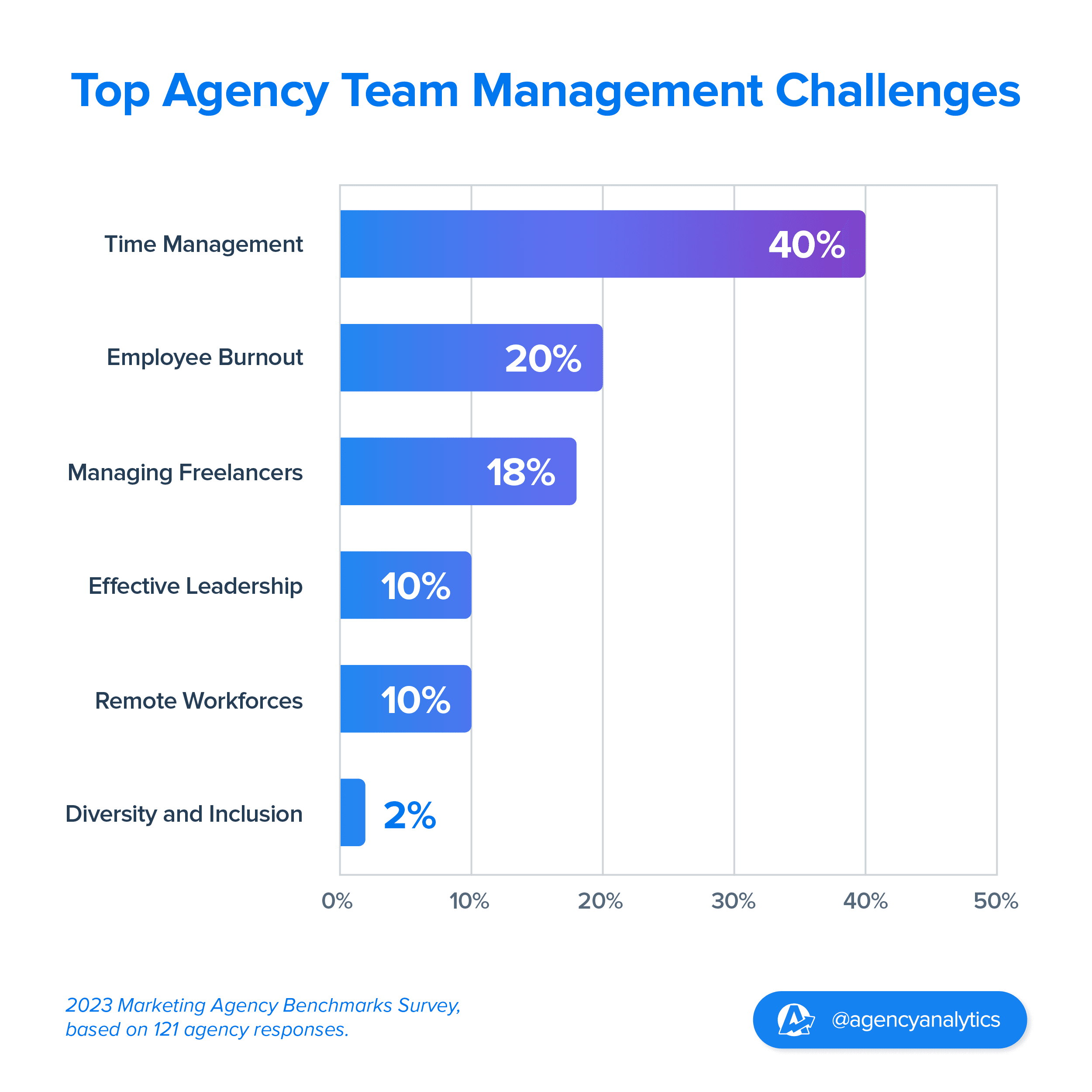
Resource management tools allow agencies to allocate their resources more efficiently across their clients and projects. Resources include your team members, technologies, physical tools, and more, and most resource management solutions accommodate multiple types of resources. Having visibility on who's working on what, using what tools, and when is important as your teams start taking on more complex work and working across different clients and projects. Every billable hour counts, so allocating resources effectively sets your team up to achieve their goals and stay within set budgets and timelines.
4. Scheduling Platforms
Scheduling tools work hand in hand with resource and project management tools to effectively manage team workloads and task assignments. They also help your team coordinate activities, meetings, and holidays and time off to make sure everyone's time is managed effectively. Many of these tools allow users to set up team member profiles with people's skills, experience level, and time off calendars so it's easier to allocate work based on all of these factors.
5. Client Reporting Tools
Client reporting tools are indispensable for agencies that want to maintain transparency and foster trust with their clients. These tools help agencies create and share detailed reports on campaign performance, financials, and other key metrics in an easily digestible format. Proper reporting not only ensures that clients are informed about the results of their investments but also helps in making data-driven decisions for future strategies.
Client reporting software provides features like automated data collection from various marketing platforms, live analytics dashboards, and customizable report templates. These facilitate the seamless generation of comprehensive reports that include metrics from social media performance, PPC campaigns, SEO results, and more.
The ability to automate and customize these reports reduces manual effort and allows for consistent updates that keep clients engaged and informed.
6. Invoicing Tools
Invoicing tools automate the process of creating and sending invoices to clients. They often also have features for things like:
Tracking payments
Managing expenses
Generating financial reports
Keeping your agency's financial records in order is a must, as is ensuring timely billing and payments. Not only will an invoicing tool alleviate the manual work of invoice management, it will also help standardize how invoices look and when they're sent out. This contributes to better client relationships because they'll know what to expect and have a more consistent experience with your brand.
7. SEO Tools
Search Engine Optimization (SEO) tools help your agency not just with content creation for clients, but also with building your own brand's online presence. These platforms conduct various SEO tasks, including things like:
Keyword research
Website analytics
Link building and fixing broken links
Tracking brand mentions
All of these activities will contribute to improved website SEO, organic traffic, and ultimately winning more leads. Any agency specializing in marketing needs to lead by example and demonstrate their know-how in their own online presence, as well as for their clients.
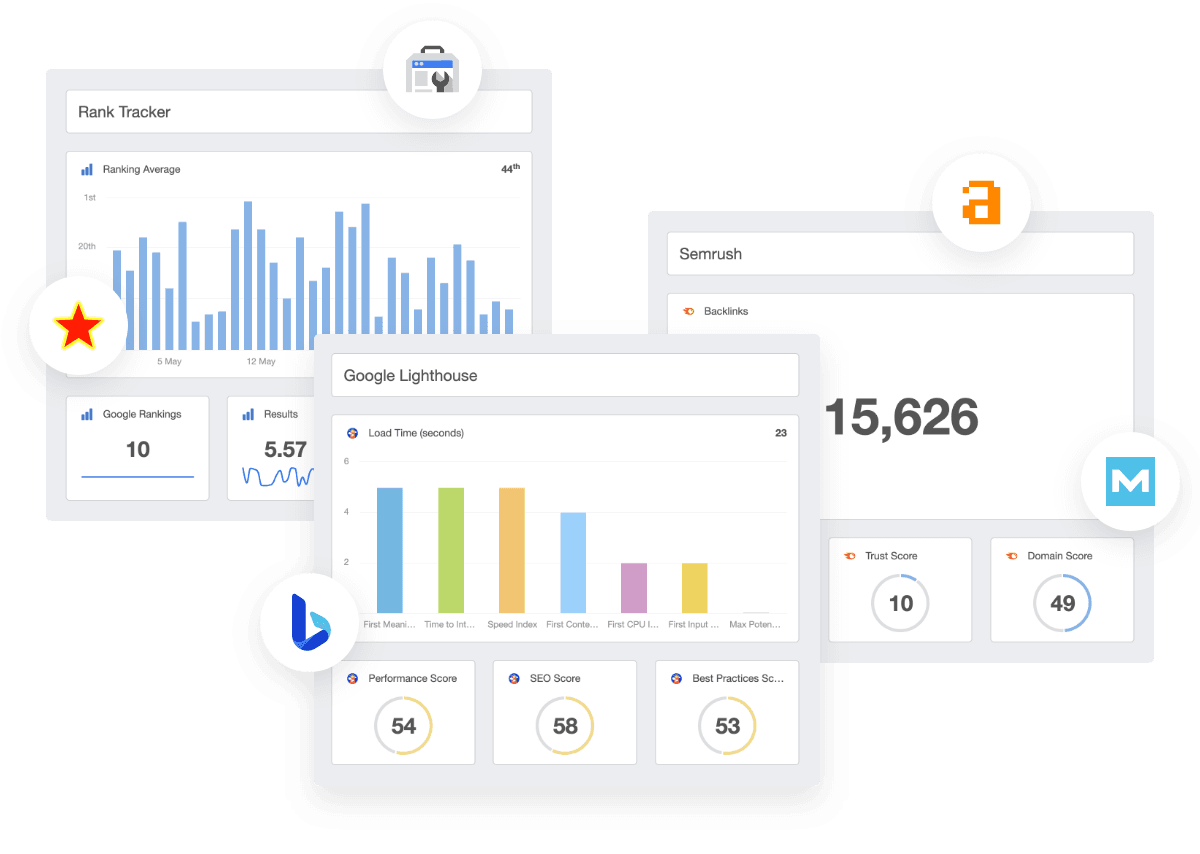
Help clients conquer organic search with a comprehensive suite of SEO tools and integrations. Start using AgencyAnalytics today with a 14-day free trial!
8. Human Resources (HR) Solutions
Your agency is nothing without its employees! Team members need to be taken care of and your human resources department needs their own tech stack to back them up.
According to recent survey data, agency leaders are poised to make investments in hiring new team members.
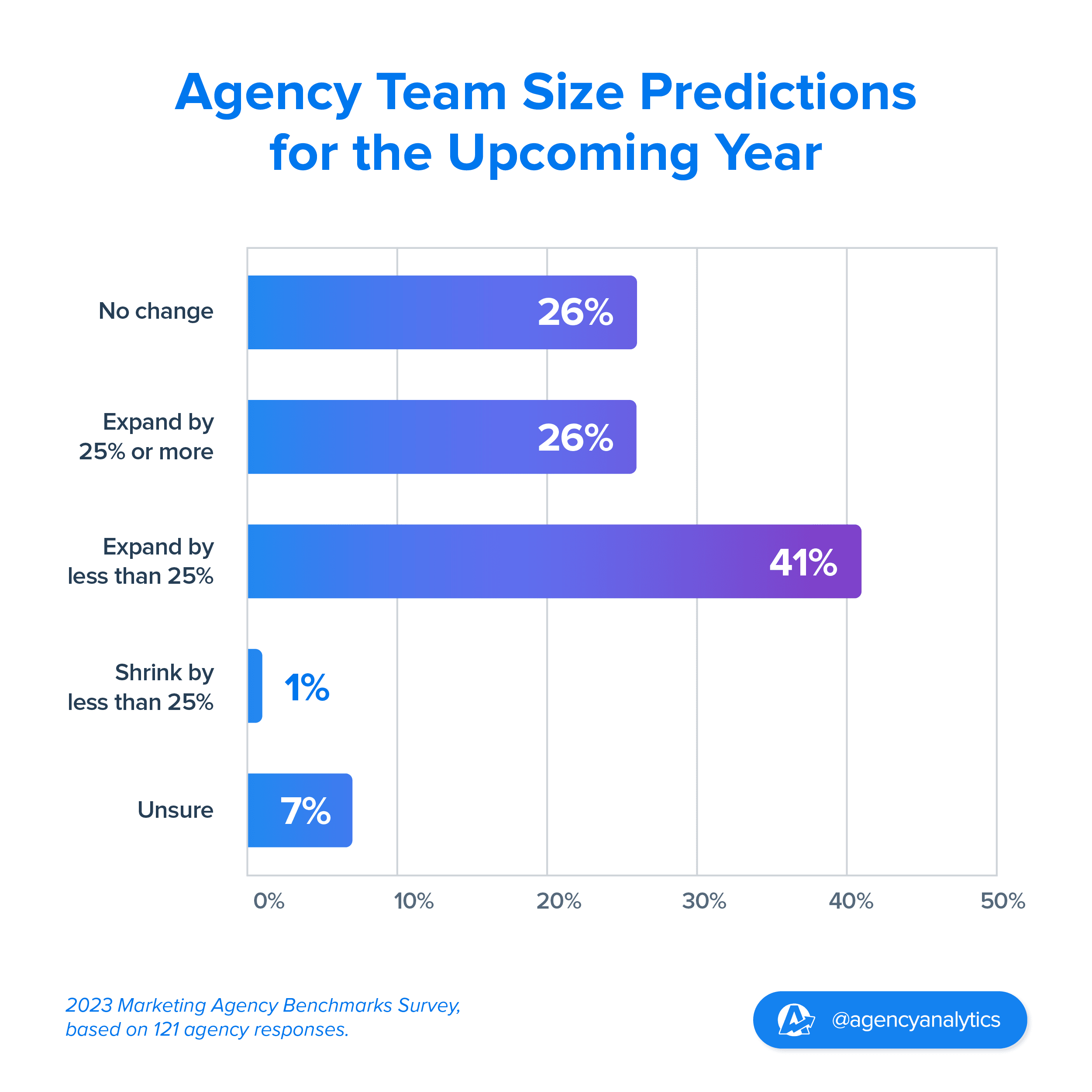
Here are a few key HR tools to make this growth smoother and easier:
Payroll Software
Payroll software automates the process of calculating and distributing employee salaries and managing tax deductions. Many also facilitate benefits administration. These tools help your HR team ensure compliance with labor laws, and reduce the risk of payroll errors.
Hiring and Recruitment Tech
Recruitment and hiring solutions streamline various aspects of the hiring process to help you build an all-star team. They might do any of the following:
Provide talent databases to source potential hires
Cross-posting job openings across multiple job boards
Auto-screen applications and narrow down candidate lists
Facilitate interview scheduling and follow-up communications
9. Website CMS
Your agency's Content Management System (CMS) is where you create, edit, and manage your website content. Most modern CMS's offer easy to use tools for building and managing the website without the need for extensive web development. This makes for a user-friendly experience and eliminates the need for an in-house team of full stack developers or for your advertising experts to write code or learn programming languages.
A CMS typically connects to your web server, web applications, and website analytics tools. This facilitates incoming and outgoing data management, and keeps your website connected to the rest of your technology stack.
10. Communication Tools
Whether it's Slack, Microsoft Teams, Zoom, an intranet, or a combination of several tools, your agency's communication channels are a pinnacle of your tech stack. The way information flows throughout your organization is a key part of your operating system, keeping things running smoothly. Communication tools typically have features like:
Direct messaging between team members
Channels or forums for teams, groups, or departments
Announcement capabilities to ensure important messages reach their intended recipients
Meeting tools like video conferencing, note-taking, and/or whiteboarding
Wikis or internal document management and organization
Communication tools also include the channels through which you communicate with clients. This could be through email, web forms, social media accounts, and even phone and SMS. In this case, a multi-channel communication management platform or call tracking tool might also be a part of your comms tech stack.
11. Creative and Design Software
Design tools are another essential element for creative agencies. These might include graphic design, user experience (UX) or user interface (UI) design, video editing, wireframing, or mockup tools. It will all depend on the kind of work your designers are doing, whether it's creating ad assets, designing web and landing pages, or storyboarding for commercials.
Just like with other teams and departments, designers often end up with a tech stack of their own. It's important for their tools to integrate with other key systems, but it's also important that design tools are friendly enough for non-technical users to access. For example, the web development process will be much more efficient if developers have access to design's UI mockups in Figma or Adobe.
12. Accounting Tools
Money makes the world go round—and at the end of the day, it's the bottom line of every business. Keeping track of your agency's expenses and finances is essential to your success. Accounting software helps to:
Automate bookkeeping
Maintain accurate financial records
Ensure compliance with tax regulations
These platforms should hook up with your payroll processing and budget management solutions to help keep all the numbers lining up correctly.
13. Artificial Intelligence (AI) Technologies
The most popular addition to every team's tech stack these days is AI. Artificial intelligence tools, such as AI data analysis tools, have a ton of potential for businesses of all kinds, from data analysis to automation, and even decision-making. Some even write ad copy and code, or generate memes and graphics.
Among the marketing agencies surveyed in 2023, 78% were already using AI for content creation. This trend spans agencies of all sizes, regardless of the number of clients or employees.
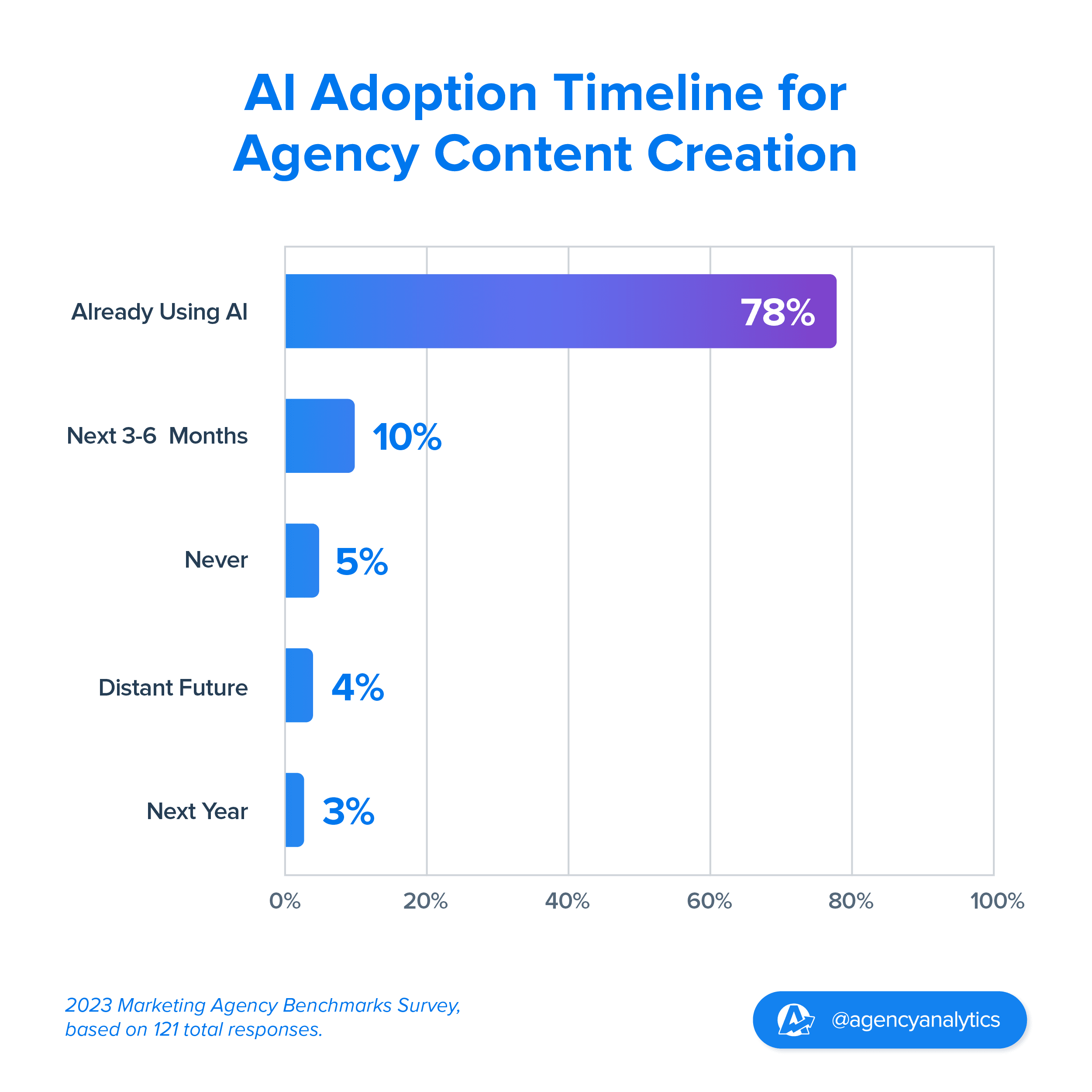
While AI has a ton of potential, remember that these AI technologies are evolving rapidly, and their applications will start to make more sense as we all get more practice with them. Keep testing and trying out new AI tech for different use cases—just be sure you're keeping track of what works, what could work, and what's ultimately creating more inefficiencies. Your team doesn't have to use AI for everything just because it's there.
14. Marketing Platforms & Technology
Last but not least, a marketing agency needs marketing technology! Your agency's marketing automation tech stack is an essential tool for success. Your marketing stack will encompass tools your team uses to manage client marketing and advertising campaigns, but also ones you use for your own marketing efforts. After all, lead generation isn't just something you do for clients—it's also how you get those clients.
Here are the top software solutions for marketing tech stacks:
Social Media Management Tools
Social media marketing platforms help with managing and scheduling posts across multiple social platforms, and may also conduct social listening. They also offer analytics and metrics tracking to help your team understand how their social campaigns perform.
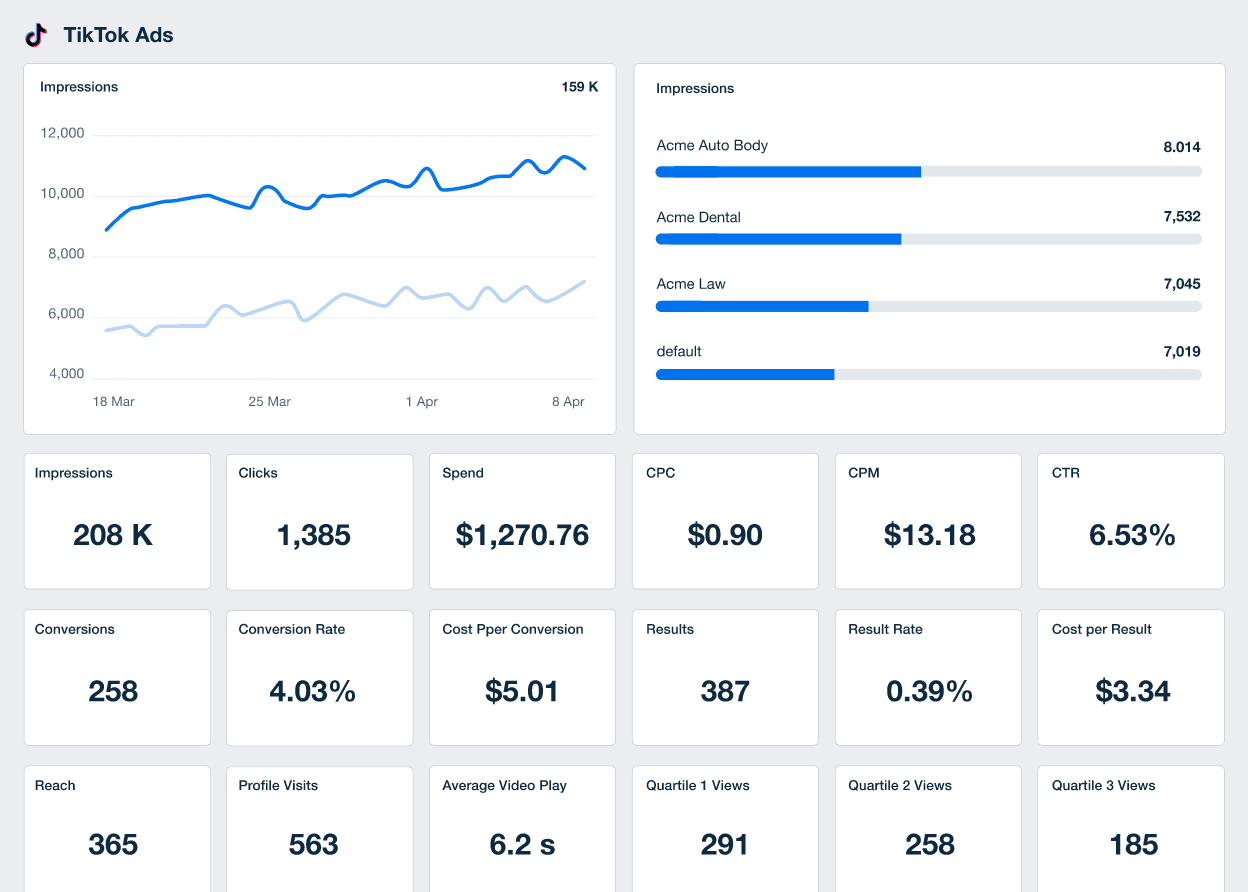
Monitor paid and organic performance across all your clients’ social media channels, including TikTok, Facebook, Instagram, LinkedIn, Snapchat and more. Try AgencyAnalytics free for 14 days!
Paid Advertising Tools
Paid advertising software allows your team to set up, manage, and track paid ad campaigns. This includes multi-platform management such as for Google Ads, Facebook Ads, and more.
Email Marketing Software
Email marketing tools automate your agency's email communications and track email performance. Features like segmentation, A/B testing, and analytics help with optimizing email content for better results.
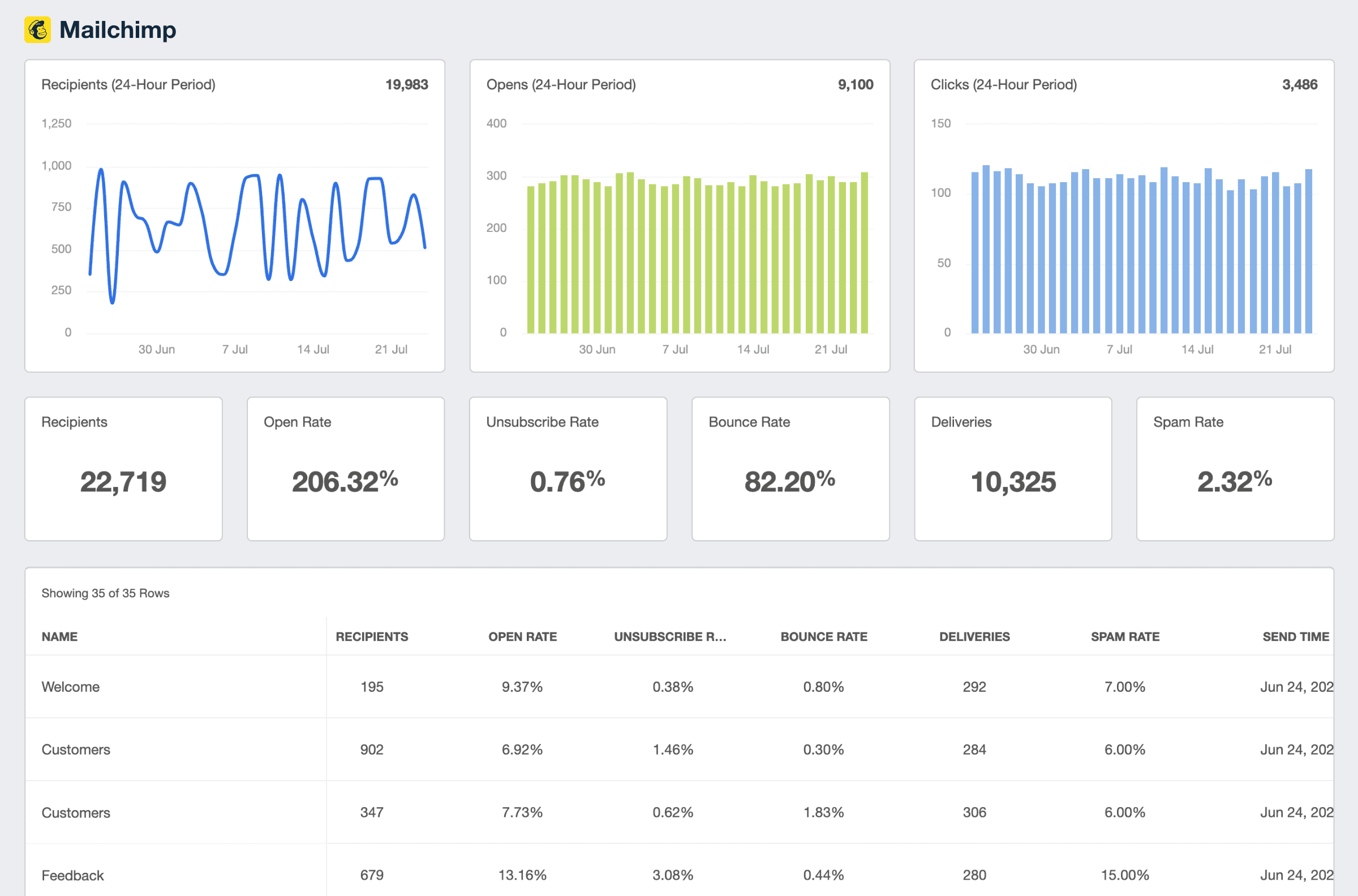
Optimize your clients’ email campaigns with data-driven decisions. Monitor email performance and create client reports and dashboards in 11 seconds with AgencyAnalytics–free for 14 days.
Marketing Analytics Tools
While individual marketing software solutions may provide some analytics capabilities, third-party marketing analytics platforms deepen your agency's ability to track and understand marketing performance. These tools offer data visualization, automated reporting, customized dashboards, and more to paint a complete picture of your campaign performance across multiple channels.
Most reporting platforms don't have the ability to include data from all components of a digital campaign. It was important for us to be able to measure and report on SEO, socials, paid search, CRM (leads), email marketing, and so on. The ability to do this and collate all the data in one central report is critical for our clients.
Brad Russell, Founder, Digital Hitmen
AgencyAnalytics is a reporting solution designed specifically for the needs of agencies. It pulls data from across your tech stack (social accounts, email software, CRM, ecommerce platform, and more) from more than 80 platform integrations into a single reporting space. This allows your team to set up personalized performance dashboards and generate customized client reports in seconds, and effectively communicate the value your agency provides.
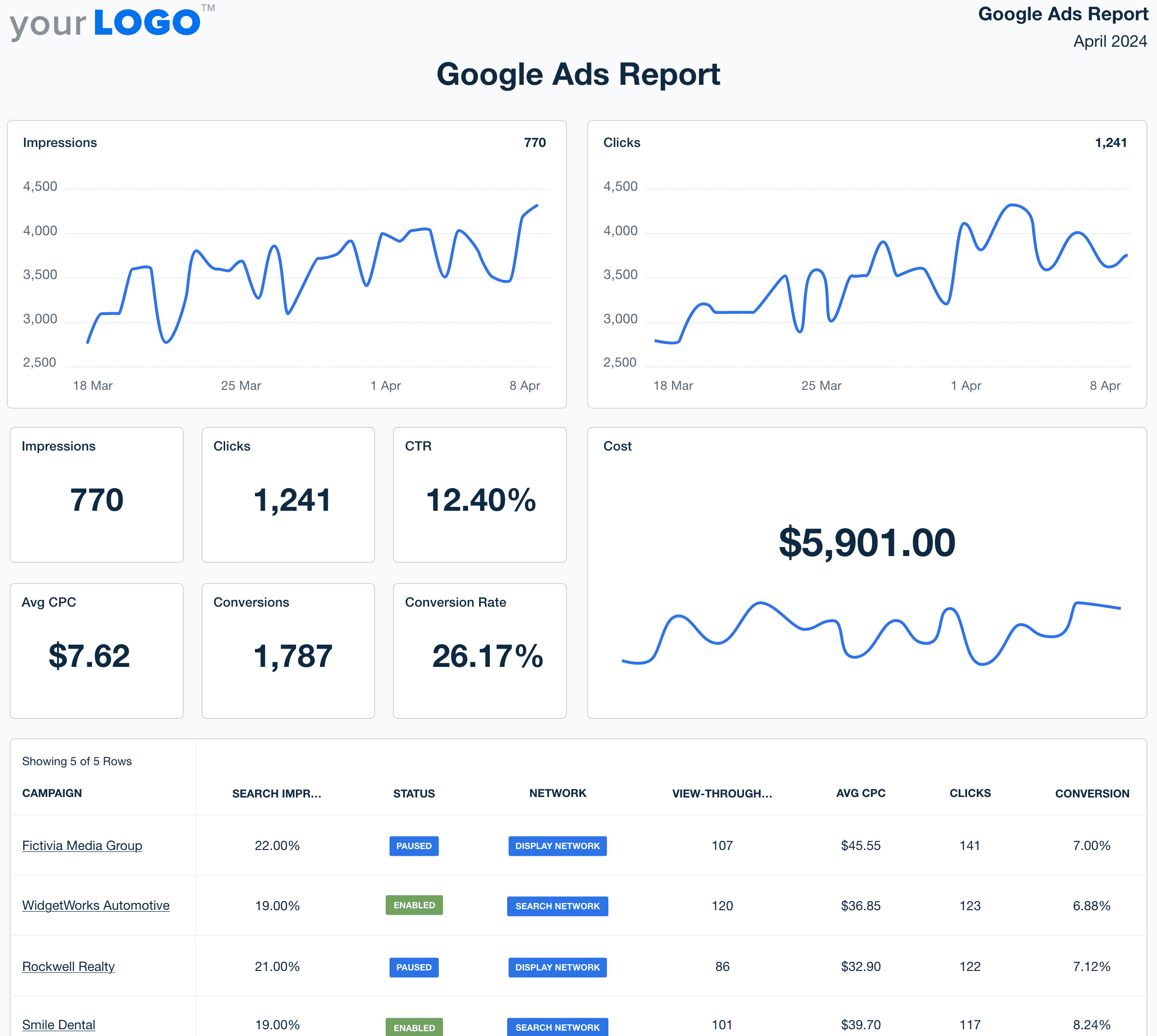
Blow your clients’ minds with comprehensive reporting featuring real-time data accessed 24/7. Proving your agency’s ROI is a breeze with AgencyAnalytics–try it free for 14 days.
Solid Tech Stacks Keep Agencies Running Smoothly
Having the right tech stack in place makes a world of difference in your agency's ability to achieve peak performance. From improving client relationships to keeping your budget in check, a technology stack with the right tools and software is integral to small businesses and large organizations alike.
Use the best practices and top technologies outlined in this article to bring together the right collection of tools to support your teams, and see the impact of a tech stack well-built.
Schedule comprehensive, automated client reports built in 11 seconds flat! Try AgencyAnalytics free for 14 days.

Written by
Kyra Evans is the Manager of Content Marketing at AgencyAnalytics. She has over 15 years of experience writing content for SaaS, tech, and finance brands. Her work has been featured by HuffPost and CBC, and she serves an engaged social media readership of over 30,000 community members.
Read more posts by Kyra EvansSee how 7,000+ marketing agencies help clients win
Free 14-day trial. No credit card required.



